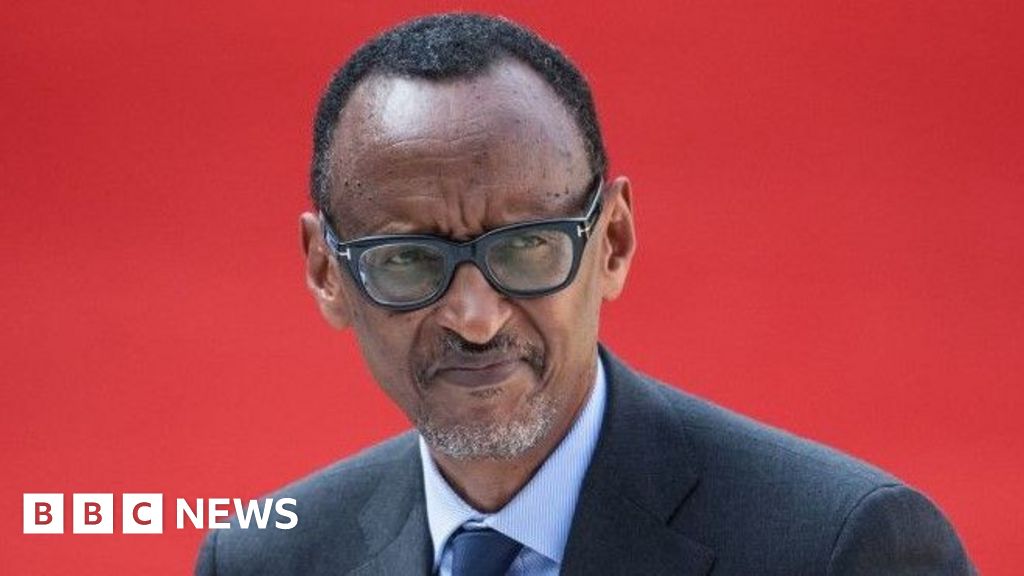- author, Danai Nesta Kupemba
- role, BBC News, London
Rwanda’s President, Paul Kagame, is both feared and respected, and is seeking to extend his 24-year rule in elections that analysts predict he will win in a landslide victory.
He has won every election since taking office in 2000, receiving more than 90% of the vote, including an astounding 99% of the vote in 2017.
Kagame, 66, is up against the only two candidates allowed to run – others have been barred from doing so by the state-run electoral commission.
President Kagame has been at the helm of Rwanda’s politics since rebels seized power after the end of the genocide in 1994 that killed about 800,000 Tutsis and moderate Hutus.
Since then, he has been praised for overseeing the country’s dramatic recovery and unifying it.
“Thirty years ago Rwanda was basically abandoned, but thanks to the leadership of President Kagame and his ruling party, Rwanda has been able to build a degree of stability,” Dr Felix Ndahinda, a Great Lakes region academic, told the BBC.
But critics accuse Kagame of tolerating no opposition, even to the point of orchestrating the assassination of dissidents across borders.
President Kagame has always strongly defended Rwanda’s human rights record, saying the country respects political freedoms.
But one analyst told the BBC that the election was merely a “formal” move.
According to the electoral commission, about 9 million people are registered to vote, including at least 2 million first-time voters.
The provisional winner should be known by Tuesday morning.
Voters will elect the president and 53 members of the lower house on Monday and the other 27 members of parliament the following day.
“It’s my first time voting so I’m really excited, I can’t wait,” Sylvia Muthoni told the BBC.
For most of Rwanda’s young people, Kagame is the only leader they have ever known.
He continued to be the country’s de facto leader while serving as Vice President and Minister of Defense from 1994 to 2000, and has served as President since 2000.
Two opposition candidates, Frank Habineza of the Democratic Green Party and independent Philippe Mpaimana, both ran in the 2017 general election but together received less than 1% of the vote.
“I believe democracy is a process,” Habineza told the BBC’s Focus on Africa podcast.
“People are still scared to express their opinions. I am fighting for freedom of speech, freedom of media,” he said.
And some Rwandans are listening to him, with one voter telling the BBC that he won’t vote for the current president.
Celestine Mutuyez, 28, was once a supporter of Kagame but was influenced by Habineza in this election.
“He’s said some great things about tackling unemployment and I’m doing exactly what he says,” he said.
But toppling President Kagame may be difficult.
Diane Rwigara, an outspoken critic of the president, has been barred from standing in the upcoming election after being disqualified from running in 2017.
“Rwanda is portrayed as a country with a growing economy, but the reality is different. People lack the basics – food, water, shelter,” she told the BBC.
The Election Commission said she had failed to submit the correct documents.
Although the country continues to suffer from high youth unemployment, it has one of Africa’s fastest growing economies.
Kagame is credited with Rwanda’s remarkable economic transformation and stability over the past three decades.
Rwanda is known globally for its clean capital city and for having the highest percentage of female members of parliament in the world, at 61%.
In their book “Rwanda Inc.”, American authors Patricia Crisafulli and Andrea Redmond describe Kagame as more like a corporate CEO than a political leader because of his “drive for excellence” in all sectors of the country.
He is also a shrewd politician.
Despite his frequent criticism of the West, he has sought to cultivate useful allies, for example working with Britain on a now-abandoned plan to deport asylum seekers to Rwanda.
Rwanda has also been exerting its soft power on the international stage, enhancing its appeal through sports, culture and entertainment.
However, Kagame’s diplomacy also has a very tough side.
Rwanda did not deny the allegations, telling the BBC that the DRC’s government lacked the political will to resolve the crisis in the mineral-rich east, where instability has persisted for decades.
During his election campaign, President Kagame promised to protect Rwanda from “outside aggression” amid rising tensions with neighbouring Democratic Republic of Congo and Burundi.
More BBC articles about Rwanda:
Image source, Getty Images/BBC


